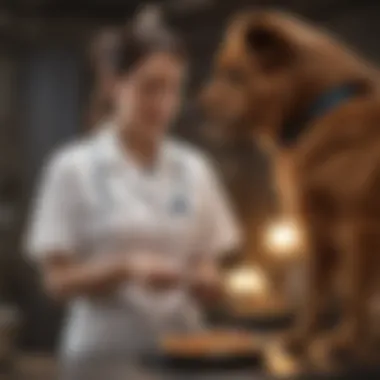Foods You Should Never Feed Your Dog: A Detailed Overview


Intro
Understanding the dietary restrictions for dogs is a significant aspect of responsible pet ownership. Owners often wish to share their meals with their pets, unaware that certain foods are detrimental to canine health. This guide will explore various categories of food that should be avoided, detailing the toxic ingredients and their potential effects on dogs. Furthermore, it will offer insights into safe alternatives and emphasize the importance of consulting a veterinarian for informed nutritional advice.
Animal Overview
Common Name and Scientific Classification
Dogs, scientifically known as Canis lupus familiaris, are domesticated mammals and man's best friend for centuries. They belong to the Canidae family, which also includes wolves, foxes, and other wild canids. Their close relationship with humans has led to varied breeds, each with unique characteristics.
Physical Characteristics
Dogs come in diverse sizes, shapes, and colors. From the tiny Chihuahua to the imposing Great Dane, their physical characteristics vary drastically. Generally, dogs possess a keen sense of smell and hearing, attributes that stem from their ancestry. Most dogs have fur, and some breeds are hypoallergenic, making them suitable for families with allergies.
Habitat and Distribution
Today, dogs are found in nearly every corner of the world. Their adaptability to various environments has seen them thrive in urban settings and rural landscapes alike. While they are domesticated animals, dogs retain instincts that align them with their wild ancestors, such as hunting and social behaviors.
Key Toxic Foods to Avoid
Chocolate
Chocolate is well-known as a dangerous food for dogs, containing theobromine and caffeine, both of which are toxic to canines. Even small amounts of chocolate can lead to symptoms like vomiting, diarrhea, and increased heart rate. Dark chocolate poses more risk than milk chocolate, so complete avoidance is advisable.
Grapes and Raisins
Both grapes and raisins are toxic to dogs. Consumption, even in small amounts, can cause kidney failure. Symptoms may not appear immediately, making it critical for owners to be vigilant about what their pets consume.
Onions and Garlic
These common kitchen ingredients can cause damage to dogs' red blood cells, leading to anemia. Signs of toxicity could include weakness, lethargy, and gastrointestinal distress. Therefore, it's best to keep onions and garlic out of reach of dogs.
Avocado
The avocado contains a substance called persin, which can be harmful to dogs. It may lead to vomiting and diarrhea, particularly in larger quantities. To be cautious, it is best to avoid feeding dogs any part of the avocado.
Safe Alternatives
Instead of harmful foods, pet owners can provide safe alternatives that contribute positively to their dog's diet. Carrots, apples, and sweet potatoes can serve as healthy snacks. These foods are not only safe but also provide essential nutrients that dogs need.
Veterinary Guidance is Essential
Engaging with a veterinarian for advice on canine nutrition can ensure that a dog receives a balanced diet. A veterinarian can help identify what foods are safe or harmful, specifically tailored to a dog's breed, age, and health condition.
Always prioritize your dog’s health by educating yourself about their dietary needs.


Preamble to Canine Diet
Understanding canine diet is crucial for the health and wellbeing of dogs. Pet owners need to recognize that dogs have unique nutritional requirements that differ significantly from those of humans. This section aims to outline key elements related to canine nutrition, focusing on the importance of appropriate food choices and the consequences of poor dietary decisions.
Dogs are not simply small humans; their digestive systems and metabolic processes are adapted over millions of years to specific types of food. A well-balanced diet contributes to optimal health, enhances immune function, and supports proper growth and development. Notably, neglecting the right dietary practices can have severe repercussions, including obesity, diabetes, or even poisoning due to ingesting harmful substances.
Key Considerations in Canine Diet:
- Species-Specific Needs: Dogs require a blend of proteins, carbohydrates, fats, vitamins, and minerals tailored to their biological makeup.
- Age and Size: Nutritional needs can vary based on age, size, and breed. Puppies, for instance, need more protein and calories compared to adults.
- Activity Level: Highly active dogs may require a different caloric intake compared to their less active counterparts.
In summary, the canine diet must be thoughtfully considered to ensure the optimal health of your dog. Acknowledging what foods contribute positively to their diet while understanding what should be avoided is essential for responsible pet ownership. By doing so, pet owners can significantly improve their dog's quality of life and longevity.
Remember, not everything safe for humans is safe for dogs. Understanding canine nutrition is key.
Understanding Dog Nutrition
Understanding dog nutrition is vital for keeping pets healthy and happy. It affects their overall well-being and can influence behavior, energy levels, and long-term health. Good nutrition supports the immune system and helps maintain a healthy weight. Inadequate or improper diets can lead to serious health problems. Thus, knowing what a dog requires in terms of nutrition is essential for responsible pet ownership.
A balanced diet should include proteins, carbohydrates, fats, vitamins, and minerals. Each nutrient plays a specific role. Proteins are crucial for muscle growth and tissue repair, while fats provide energy and support cellular function. Both carbohydrates and fiber aid in digestion and energy supply.
Key Considerations About Dog Nutrition:
- Different breeds have varying nutritional needs.
- Age impacts dietary requirements; puppies need different nutrients compared to seniors.
- Activity level matters; more active dogs might require more calories.
- Allergies and health issues should be taken into account while deciding on a diet.
By understanding these elements, one can develop a more informed approach to feeding dogs, ensuring they receive the necessary nutrients without harmful additives or unsuitable foods.
General Categories of Foods to Avoid
Understanding the general categories of foods that can be dangerous for dogs is essential for pet owners. When humans enjoy certain foods, they may not consider the harmful effects these same foods can have on canine companions. Specifically, some human foods are outright toxic to dogs while others can lead to serious health issues from ingredients contained in processed foods and additives. Being informed about these dangers can lead to healthier choices for pets and improve their overall wellbeing.
Human Foods That Are Toxic
Certain human foods are known to be toxic to dogs. These foods often contain compounds that can cause poisoning or adverse reactions in dogs. For example, chocolate contains theobromine, which can lead to symptoms such as vomiting, increased heart rate, and even seizures. Similarly, grapes and raisins can cause kidney failure in dogs, with effects sometimes seen within hours after ingestion.
The following is a list of human foods that are toxic to dogs:
- Chocolate: Even small amounts can be harmful.
- Grapes and Raisins: No known safe quantity exists.
- Onions and Garlic: Can damage red blood cells.
- Xylitol: Often found in sugar-free products; can cause insulin spikes.
- Avocado: Contains persin, which is harmful to dogs.
- Alcohol: Even small amounts can be dangerous.
- Macadamia Nuts: Affects the nervous system.
- Cooked Bones: Can splinter and cause internal injuries.
If a dog accidentally consumes any of these items, immediate veterinary consultation is critical.
Processed Foods and Additives
Processed foods can pose risks for dogs as well. These foods often contain additives and preservatives that are unsafe for canine consumption. Ingredients such as artificial sweeteners, excess salt, and various chemicals can lead to gastrointestinal issues and other health problems. Some dogs may even have allergies to common additives found in processed food.
Consider the following points regarding processed foods:
- High Sodium Content: Excessive salt can lead to sodium ion poisoning.
- Artificial Preservatives: Chemicals used to extend shelf life can harm dogs over time.
- Sugars and Sweeteners: Xylitol and other sweeteners are especially dangerous.
- Fats and Oils: High-fat foods can lead to pancreatitis in dogs.


Understanding which processed foods contain harmful additives can help pet owners avoid unintentional poisoning.
Specific Foods that are Hazardous
Understanding which specific foods can pose dangers to dogs is crucial for everyone who cares for these animals. Many pet owners may not realize that their favorite snacks or meal remnants can threaten their pet's health. This section provides a detailed look at particular food items that are widely known to have severe repercussions on canine wellbeing. Knowing these foods can help owners make informed decisions and protect their furry companions from dangerous health issues.
Chocolate and Caffeine
Chocolate, particularly dark chocolate, contains theobromine and caffeine, both of which are toxic to dogs. Even small amounts can induce symptoms such as vomiting, diarrhea, rapid heart rate, and in severe cases, seizures or death. The darker the chocolate, the higher the concentration of theobromine. It's essential for dog owners to keep any chocolate completely out of reach from their pets. Reading labels for every treat can also help prevent accidental ingestion.
Grapes and Raisins
Grapes and raisins are among the most surprising foods that can be detrimental to dogs. They are known to cause acute kidney failure in some dogs, but the exact mechanism remains unclear. Just a small amount can trigger symptoms like vomiting, lethargy, and dehydration. The sensitivity varies from one dog to another, meaning there is no safe amount. If a dog shows signs of discomfort after consuming these fruits, immediate veterinary consultation is necessary.
Onions and Garlic
Both onions and garlic belong to the allium family, which is harmful to dogs. These foods can cause oxidative damage to red blood cells, leading to hemolytic anemia. Symptoms may include weakness, lethargy, and pale gums. Cooked, raw, or powdered forms possess similar dangers. Dog owners must be vigilant about any foods seasoned with these ingredients. Even small amounts over time can accumulate and lead to severe health issues.
Xylitol and Sugar Substitutes
Xylitol is a sugar substitute commonly found in sugar-free products like gum, candies, and some peanut butters. Even a small amount can lead to a sudden release of insulin in dogs, resulting in hypoglycemia. Symptoms of xylitol poisoning include vomiting, loss of coordination, and in severe cases, liver failure. Checking ingredient lists is paramount in preventing potential xylitol toxicity.
Avocado
Avocado contains persin, a substance that can be harmful to dogs. While dogs may tolerate small quantities, larger amounts can cause gastrointestinal upset. Some breeds can be more sensitive than others. Given that avocado is a common ingredient in many human foods, pet owners should be careful about sharing their meals, especially if they include this fruit. Think twice before giving a dog anything containing avocado.
Alcohol
Alcohol is highly toxic to dogs. Even a small amount can lead to staggering, difficulty breathing, and even coma or death. Many dog owners may not realize that foods containing alcohol, like baked goods, can pose a similar risk. It's imperative to keep any form of alcohol away from pets. If ingestion occurs, prompt medical attention is critical.
Macadamia Nuts
Macadamia nuts are another hazardous item for dogs. They can adversely affect the dog's muscles, leading to weakness, tremors, and hyperthermia. The safe quantity is unclear, but it's best to avoid giving any nuts to dogs altogether. Symptoms usually appear within 12 hours after ingestion and can last around 48 hours. Quick veterinary support is necessary if these symptoms are noticed.
Cooked Bones
Cooked bones pose a significant danger to dogs. Cooking changes the structure of bones, making them brittle. When dogs chew on cooked bones, they can splinter. This can lead to choking, blockages, or serious damage to the gastrointestinal tract. Instead, offering raw bones under supervision may be a safer option. Always consult with a veterinarian regarding the best way to incorporate bones into a dog’s diet.
Remember, being vigilant about what goes into your dog's diet is essential for their overall health and longevity. Regularly consulting with a veterinarian can offer tailored advice based on individual dogs and their unique needs.
Potential Symptoms of Food Poisoning in Dogs
Understanding the potential symptoms of food poisoning in dogs is essential for any dog owner. Recognizing these symptoms quickly can make a significant difference in the well-being of your pet. Food poisoning may arise from ingesting toxic substances or unsuitable human food, leading to various health issues. The ability to identify early signs can prompt timely veterinary intervention, which is vital for avoiding serious complications or even the risk of death. Awareness of these symptoms primarily benefits pet owners, allowing them to take immediate action and ensure their dog's safety.
Immediate Signs to Watch For
When a dog consumes harmful foods, certain immediate symptoms can manifest. It is crucial for dog owners to remain vigilant. Typical immediate signs include:


- Vomiting: This is one of the most common reactions. If a dog vomits persistently after eating, it may indicate poisoning.
- Diarrhea: Frequent loose or watery stools can point to gastrointestinal distress.
- Lethargy: A sudden lack of energy or enthusiasm might indicate something wrong.
- Loss of Appetite: Refusing to eat can be a signal of underlying health issues.
- Abdominal Pain: Signs such as whining, pacing, or a tense abdomen might suggest discomfort.
- Unusual Behavior: Changes in behavior, such as disorientation or agitation, can also be warning signs.
It is essential to observe these signs carefully. If any of these symptoms appear, it's advisable to consult a veterinarian promptly.
Long-Term Health Implications
The long-term health implications of food poisoning in dogs can be severe, depending on the type of toxin and how quickly treatment is received. Some possible effects include:
- Chronic Gastrointestinal Issues: Even if a dog seems to recover, it might face ongoing digestive problems.
- Kidney Damage: Certain toxins, like those from grapes and raisins, can lead to renal failure over time.
- Liver Damage: Long-lasting liver issues can emerge from substances like xylitol.
- Neurological Problems: In some cases, the ingestion of specific foods can cause lasting effects on a dog's nervous system, leading to seizures or other severe issues.
- Weakened Immune System: This can make dogs more susceptible to infections and other diseases.
Understanding the potential long-term implications reinforces the need to prevent dogs from consuming hazardous foods. Regular check-ups and maintaining a dialogue with a veterinarian can help monitor a dog's health status after a poisoning incident, ensuring a better quality of life.
Awareness is key. Remember that taking proactive steps can safeguard your dog's health and longevity.
Safe Alternatives and Healthy Options
Understanding safe alternatives and healthy options is vital when managing your dog's diet. While certain human foods can be harmful, there are nutritious options available that can satisfy your pet's needs and cravings. Choosing safe foods not only prevents health issues but also promotes good behavior and enhances overall well-being for your furry friend.
Nutritious Treats for Dogs
When looking for alternatives, consider options that provide essential nutrients. For instance, vegetables like carrots, peas, or green beans can serve as excellent low-calorie snacks. Fruits such as blueberries and apple slices (without seeds) are tasty and rich in vitamins. These foods can aid in dental health and provide fiber, which is beneficial for digestion.
It's essential to introduce any new treat gradually. Observing your dog's reaction ensures that they do not have sensitivities or allergies. Additionally, keep portions controlled to prevent obesity, as even healthy treats can contribute to weight gain if given in excess.
A few nutritious options include:
- Carrots: Good for teeth and low in calories.
- Pumpkin: A source of fiber and vitamin A.
- Sweet Potatoes: Rich in beta-carotene and a good energy source.
- Chicken or Beef: Lean, cooked meat can be a protein-rich treat, just ensure it’s unseasoned.
Providing these healthy alternatives can create a balanced and enjoyable diet for your dog, improving their health and happiness.
Consulting a Veterinarian
Consulting a veterinarian is not just a precaution but a necessity when making changes to your dog's diet. Different dogs have varying nutritional needs based on their breed, age, activity level, and health status. A vet can provide tailored advice on safe foods and suitable portions. They may also suggest specific brands of dog food or treats that meet nutritional standards.
Regular check-ups can help identify any underlying health problems that might affect dietary choices. Moreover, veterinary guidance can also assist in understanding symptoms of food allergies or intolerances, allowing for timely intervention.
Benefits of consulting a veterinarian include:
- Personalized dietary advice.
- Early detection of health issues related to diet.
- Recommendations on high-quality dog food brands.
Utilizing these safe alternatives and seeking professional advice ensures your dog can enjoy a varied diet without jeopardizing their health. Understanding and prioritizing proper nutrition can significantly enhance your dog's quality of life.
Key Insight: Responsible pet ownership involves not just avoiding harmful foods but also providing nourishing alternatives tailored to your dog's specific needs.
The End
Understanding which foods are harmful to dogs is crucial for responsible pet ownership. The potential dangers posed by certain human foods can lead to severe health complications or even prove fatal. Throughout this article, we outlined a comprehensive list of dangerous items, including chocolate, grapes, onions, and more. Such specific knowledge empowers dog owners to make informed decisions, preventing accidental poisoning.
The importance of vigilance cannot be overstated. Observing changes in a dog's behavior after consumption of dubious foods is critical. Instant reactions—like vomiting or lethargy—serve as warning signs. Long-term exposure to harmful substances can also cause serious health issues that manifest gradually.
Providing safe alternatives is another key factor. Nutritious options exist that satisfy dogs' cravings without compromising their health. Instead of table scraps or processed snacks, consider offering fruits like bananas or vegetables such as carrots. These healthy treats enrich their diet and enhance overall well-being.
Consulting a veterinarian plays an integral role in maintaining a dog's health. Regular check-ups allow for assessment of dietary needs tailored to individual pets. Furthermore, veterinary guidance aids in staying updated about new findings on food safety and canine nutrition.







